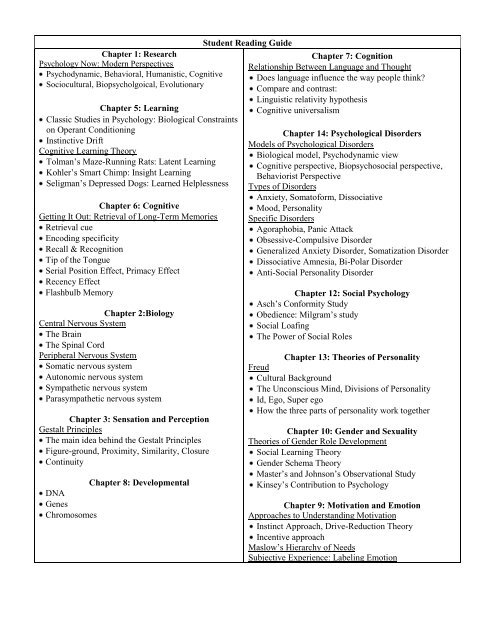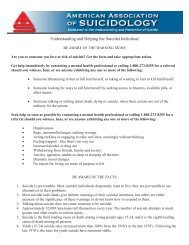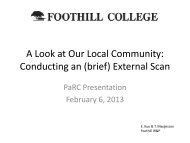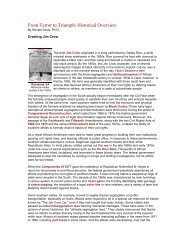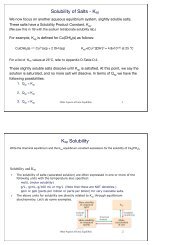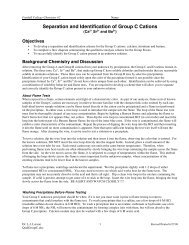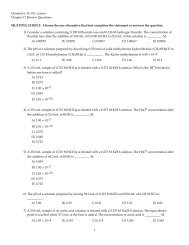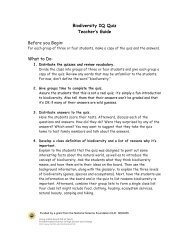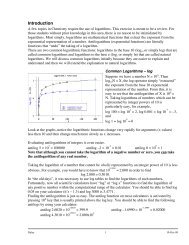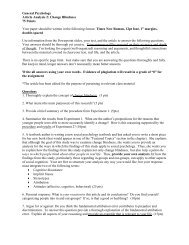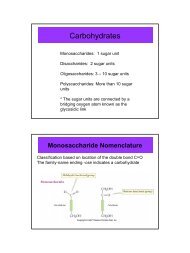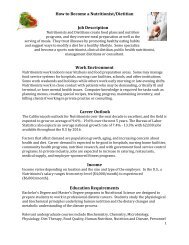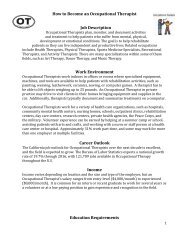General Psychology Psychology 1 Section 08 ... - Foothill College
General Psychology Psychology 1 Section 08 ... - Foothill College
General Psychology Psychology 1 Section 08 ... - Foothill College
You also want an ePaper? Increase the reach of your titles
YUMPU automatically turns print PDFs into web optimized ePapers that Google loves.
Chapter 1: Research<br />
<strong>Psychology</strong> Now: Modern Perspectives<br />
Psychodynamic, Behavioral, Humanistic, Cognitive<br />
Sociocultural, Biopsycholgoical, Evolutionary<br />
Chapter 5: Learning<br />
Classic Studies in <strong>Psychology</strong>: Biological Constraints<br />
on Operant Conditioning<br />
Instinctive Drift<br />
Cognitive Learning Theory<br />
Tolman’s Maze-Running Rats: Latent Learning<br />
Kohler’s Smart Chimp: Insight Learning<br />
Seligman’s Depressed Dogs: Learned Helplessness<br />
Chapter 6: Cognitive<br />
Getting It Out: Retrieval of Long-Term Memories<br />
Retrieval cue<br />
Encoding specificity<br />
Recall & Recognition<br />
Tip of the Tongue<br />
Serial Position Effect, Primacy Effect<br />
Recency Effect<br />
Flashbulb Memory<br />
Chapter 2:Biology<br />
Central Nervous System<br />
The Brain<br />
The Spinal Cord<br />
Peripheral Nervous System<br />
Somatic nervous system<br />
Autonomic nervous system<br />
Sympathetic nervous system<br />
Parasympathetic nervous system<br />
Chapter 3: Sensation and Perception<br />
Gestalt Principles<br />
The main idea behind the Gestalt Principles<br />
Figure-ground, Proximity, Similarity, Closure<br />
Continuity<br />
Chapter 8: Developmental<br />
DNA<br />
Genes<br />
Chromosomes<br />
Student Reading Guide<br />
Chapter 7: Cognition<br />
Relationship Between Language and Thought<br />
Does language influence the way people think?<br />
Compare and contrast:<br />
Linguistic relativity hypothesis<br />
Cognitive universalism<br />
Chapter 14: Psychological Disorders<br />
Models of Psychological Disorders<br />
Biological model, Psychodynamic view<br />
Cognitive perspective, Biopsychosocial perspective,<br />
Behaviorist Perspective<br />
Types of Disorders<br />
Anxiety, Somatoform, Dissociative<br />
Mood, Personality<br />
Specific Disorders<br />
Agoraphobia, Panic Attack<br />
Obsessive-Compulsive Disorder<br />
<strong>General</strong>ized Anxiety Disorder, Somatization Disorder<br />
Dissociative Amnesia, Bi-Polar Disorder<br />
Anti-Social Personality Disorder<br />
Chapter 12: Social <strong>Psychology</strong><br />
Asch’s Conformity Study<br />
Obedience: Milgram’s study<br />
Social Loafing<br />
The Power of Social Roles<br />
Chapter 13: Theories of Personality<br />
Freud<br />
Cultural Background<br />
The Unconscious Mind, Divisions of Personality<br />
Id, Ego, Super ego<br />
How the three parts of personality work together<br />
Chapter 10: Gender and Sexuality<br />
Theories of Gender Role Development<br />
Social Learning Theory<br />
Gender Schema Theory<br />
Master’s and Johnson’s Observational Study<br />
Kinsey’s Contribution to <strong>Psychology</strong><br />
Chapter 9: Motivation and Emotion<br />
Approaches to Understanding Motivation<br />
Instinct Approach, Drive-Reduction Theory<br />
Incentive approach<br />
Maslow’s Hierarchy of Needs<br />
Subjective Experience: Labeling Emotion


